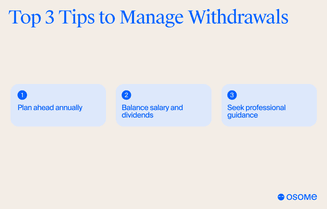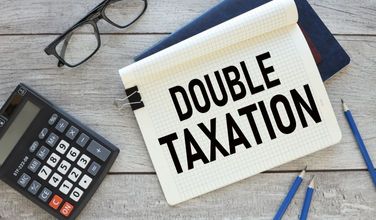How To Withdraw Money from a Private Limited Company in Singapore?
- Published: 3 February 2025
- 11 min read
- Running a Business


Heather Cameron
Author
From expert guidance and helpful accounting tips to insights on the latest trends in fintech, Heather is here to empower entrepreneurs and small business owners in Singapore with great content. With a background in digital marketing spanning eight years, she has experience writing for various industries and audiences. As Osome’s copywriter, she’s here to inform and inspire our readers with great storytelling.

John Yap
Reviewer
John Yap, our Head of the Accounting Team in Singapore, brings over a decade of expertise in SFRS, corporate tax, and GST compliance. As a key blog reviewer, John ensures our accounting content is accurate and relevant, transforming complex concepts into actionable advice. With John's meticulous oversight, you can trust that our blog provides reliable and up-to-date information to help you navigate the intricacies of financial management and compliance in Singapore.

Nisah Rahim
Reviewer
Nisah Rahim is our go-to expert reviewer for all things Corporate Secretary-related in Singapore. As the Corporate Secretary Team Lead and content reviewer, Nisah meticulously examines our blog posts to ensure we provide comprehensive information on Corporate Secretary services such as local regulatory compliance, managing board meetings, maintaining company records, and providing expert advice on corporate governance matters.
Wondering how to withdraw funds from a private limited company? This guide covers the main methods: salary, dividends, director’s loan accounts, and expense reimbursements. We’ll explain each method’s steps and tax implications to help you understand how to withdraw money from private limited companies in an informed and compliant manner.
Key Takeaways
- Only directors and shareholders of a private limited company are eligible to withdraw funds, and they must adhere to specific legal and financial regulations to ensure compliance and financial stability.
- Withdrawal methods include paid salary, dividends, loans, and reimbursements for expenses, each with distinct procedures and tax implications that require careful planning.
- Accurate record-keeping and reporting for all withdrawals are essential to maintaining compliance with financial regulations and tax obligations, aiding directors in optimising their financial decisions.
Understanding Private Limited Company Withdrawals
Understanding who is eligible to withdraw money from a private limited company and the associated regulations is essential. Only directors and shareholders can withdraw funds, and this authority comes with specific responsibilities and regulations that must be adhered to.
To ensure transparency and legal compliance, directors and shareholders must follow specific legal and financial regulations when withdrawing funds. This protects both the individual and the limited company from potential legal issues and is the foundation for making informed financial decisions.
Looking to set up a private limited company in Singapore? Osome can help! We offer efficient incorporation services to streamline the process and ensure you comply with all legal requirements. Our team can guide you through the registration process, allowing you to focus on the bigger picture of running your business.
Who Can Withdraw Money?
Only company directors and shareholders can withdraw money from a private limited company, ensuring that those with a vested interest in the limited company’s success control fund distribution. This privilege is accompanied by rules and regulations to ensure legal withdrawals that do not jeopardise the company’s financial stability.
Directors must follow legal withdrawal methods to comply with financial regulations, safeguarding both the company’s financial health and their personal legal standing.
Shareholders, for instance, are only liable up to the extent of their capital investment, as the company has its own legal identity. This protects them from personal liability for the limited company’s debts beyond their investment in shares, and is a significant advantage of owning shares in a private limited company.
Methods for Withdrawing Money from a Private Limited Company
Having established who can withdraw funds, let’s explore the primary methods: director’s salary payments, dividend payments, director’s loans, and reimbursement of business expenses.
Each method comes with distinct procedures, benefits, and implications, necessitating careful selection based on financial needs and company profitability.

Director's salary payments
For directors in Singapore, payments of salary are considered employment income and are subject to taxes. The tax rate varies depending on the individual's income bracket. Directors must file a with the Inland Revenue Authority of Singapore (IRAS) to declare their income and pay the applicable business taxes.
The tax rates are progressive, starting from 0% for the lowest income bracket and increasing gradually. Accurate reporting of all income is crucial to ensure compliance with tax regulations and avoid penalties. Understanding the tax consequences of salaries allows directors to make informed decisions about their remuneration and minimise their liabilities.
Dividend payments
Dividend payments in Singapore offer a tax-efficient method for shareholders to withdraw funds. Companies are subject to a 17% corporate tax rate. Dividends can only be paid from business profits after this tax has been deducted. Notably, under Singapore's tax regime and directives from the Companies House, dividends received by resident individuals are generally tax-exempt. This makes dividends an attractive option for shareholders to withdraw profits while minimising their personal tax liabilities.
Furthermore, Singapore offers attractive tax incentives for startups, including the Startup Tax Exemption (SUTE) scheme, which provides a 75% tax exemption on the first S$ 100,000 of chargeable income for the first three years. These exemptions can significantly enhance the tax efficiency of dividend distributions for qualifying companies.
Careful planning when paying dividends can help directors and business owners maintain a healthy profit margin, making this method suitable for financially stable companies.
Director's loans
These loans offer flexible and quick access to funds for company directors. These loans can be used to cover personal expenses or other financial needs, but they come with specific financial implications. The balance in the loan account can be in credit, nil, or overdrawn. If the limited company owes money to the director, the account will be in credit, allowing for reclamation without liabilities. Additionally, these loans can provide an alternative funding option for directors.
However, if the loan account remains overdrawn, meaning the director owes money to the limited company, tax liabilities are determined by the money owed and the duration of the overdraft. Repaying loans within nine months of the financial year-end avoids additional tax charges.
Positive balances in financial statements are essential for managing these loan accounts effectively.
A meticulous record of all loans must be maintained in the loan account. This documentation ensures transparency and compliance with financial regulations, safeguarding both the director and the company from potential legal issues.
Reimbursement of business expenses
Reimbursement of expenses is another legitimate method for directors to make a withdrawal from a private limited company. Directors can cover costs incurred during business operations by claiming these expenses. However, it’s essential to ensure that all claimed expenses are strictly for business purposes to maintain compliance. This method not only helps in managing cash flow but also provides tax relief for the company.
To claim reimbursement for expenses, directors must keep receipts, fill out claim forms, and record refunds in the company accounts. Proper documentation substantiates expense claims and ensures compliance with tax laws. Accurate records help directors manage withdrawals efficiently and adhere to legal requirements.
Tax Implications of Different Withdrawal Methods
Each method of withdrawing money comes with unique tax consequences. Understanding these is essential for optimising financial outcomes and ensuring tax compliance.
Each method — payments, dividends, or loans — has specific liabilities and benefits requiring careful analysis.
Withdrawal Method | Tax Implications Features to Consider |
|---|---|
| Director's Salary | Subject to Income Tax in Singapore. |
| Tax rate varies based on individual's income bracket. | |
| Directors must file an income tax return with IRAS. | |
| Dividends | Company subject to 17% Corporate Tax. |
| Generally tax-free for Singaporean resident shareholders. | |
| Benefit from Startup Tax Exemptions for eligible companies. | |
| Director's Loans | May be considered a taxable employment benefit if interest-free or subsidised. |
| Loans must be at arm's length and properly documented. |
Income tax on director's salary
For directors in Singapore, annual salary earnings are considered employment income and are subject to tax. The tax rate varies depending on the individual's income bracket. Directors must file an income tax return with the Inland Revenue Authority of Singapore (IRAS) to declare their personal income and pay the applicable taxes. Accurate reporting of all income is crucial to ensure compliance with tax regulations and avoid penalties. Understanding the implications of salaries allows directors to make informed decisions about their remuneration and minimise their tax liabilities.
Corporation tax and dividend income
In Singapore, corporate tax applies to private company profits, ensuring clear separation of the company's assets from personal funds under its own legal identity. The current corporate tax rate is 17%. Dividends can only be paid from company profits after companies pay corporation tax. For Singaporean resident shareholders, dividends are generally tax-exempt, making them a tax-efficient way to withdraw company profits. New start-ups in Singapore can benefit from significant tax exemptions, such as the Startup Tax Exemption (SUTE) scheme, which provides a 75% tax exemption on the first S$ 100,000 of chargeable income for the first three years. These tax incentives can significantly reduce the tax burden for both the private company limited by shares and its shareholders. Dividend payments in Singapore have distinct taxes. Companies are subject to a corporate tax rate of 17%. Dividends can only be paid from profits after this tax has been deducted.
Under Singapore's tax regime, dividends are generally tax-free in the hands of shareholders, making them a tax-efficient method for withdrawing profits.
Furthermore, Singapore offers attractive tax incentives for startups, including a 75% tax exemption on their first S$ 100,000 of chargeable income for the first three financial years. These exemptions significantly enhance the tax efficiency of dividend distributions for qualifying companies.
Personal tax liabilities on director's loans
Director's loans in Singapore can have tax consequences. If a director receives a loan from their private company limited by shares, the benefit received from an interest-free or subsidised loan may be considered as a taxable employment benefit. This is because Singapore tax law views company directors as employees.
It's crucial to ensure that any loans to directors are at arm's length and properly documented to avoid potential tax issues, as is always the case when an officer in any limited company borrows money. Careful consideration of the financial implications of loans is essential for directors to make informed financial decisions and ensure compliance with Singaporean tax regulations.
Compliance and Record-Keeping Requirements
Accurate record-keeping ensures compliance with financial regulations and legal standards. Detailed records of transactions, including payments, dividends, loans, and expense refunds, ensure transparency and tax law compliance.
These records must be retained for a minimum of five years to support reported income and tax deductible expenses.
Income tax return
Directors and business owners must accurately report all taxable income, including salary, any annual dividend allowance, and other income, in their tax returns. Accurate reporting ensures compliance with Singapore's tax laws and helps avoid penalties.
Directors are not required to be registered as employers with any specific agency in Singapore.
All claimed expenses related to business income should be included in the income tax return. This inclusion helps in maintaining transparency and compliance with tax regulations. By accurately reporting income and expenses, directors can ensure they meet all their tax obligations effectively.
Company tax return
All reimbursed expenses for directors or employees must be reported in the limited company’s tax return. This information should be included in the employment section. Reimbursed expenses to directors or employees must be included in the company tax return for transparency and tax law compliance. This documentation is crucial for accurate financial records and avoiding potential tax issues.
Taking out funds from a director’s loan account may trigger taxes if the outstanding loan amount is not repaid within a specified timeframe or if it results in an overdrawn loan account. To avoid additional tax charges, the loans must be repaid to the limited company within nine months of the financial year-end. By adhering to these requirements, directors can manage their withdrawals effectively and ensure compliance with financial regulations.
Documentation for expense claims
Proper documentation is essential for substantiating expense claims. This includes keeping receipts and detailed claim forms to support business expenses. Proper documentation such as receipts and invoices is necessary to substantiate claims for business expenses. This ensures that all claimed expenses are legitimate and comply with tax regulations when business owners reclaim money.
Documentation for business expense claims includes receipts and specific claim forms, retained for audit purposes.
Accurate records substantiate expense claims and avoid legal issues related to tax compliance.
Tips for Efficiently Managing Withdrawals
Effective financial management requires directors to stay aware of their company’s cash flow regularly. Ensuring legal compliance is a vital aspect of managing a private company. Directors should stay informed, plan strategically, and seek expert advice to manage money withdrawals effectively.

By following these tips, directors can manage their withdrawals efficiently and optimise their financial outcomes.
Annual planning for withdrawals
At the start of each year, directors should assess their company’s financial position and personal tax situation for effective planning. Directors should compare effective tax rates of different withdrawal methods to minimise tax liabilities. Combining various methods helps meet personal financial needs while optimising tax efficiency and making sure to pay national insurance contributions.
Annual planning allows directors to strategically time withdrawals to align with financial goals and tax obligations. This proactive approach ensures financial decisions are made with a clear understanding of potential tax impact.
Balancing salary and dividends
Directors can withdraw funds as salary through the PAYE system, which is subject to tax and national insurance contributions. Dividends are paid out to shareholders and can be a tax-efficient way to withdraw profits, given they are only taxed at the personal income tax band if certain conditions are met.
Balancing payments and dividends allows directors to optimise their overall tax liabilities. It ensures both methods are utilised effectively.
Balancing these withdrawal methods helps directors meet financial needs while minimising tax liabilities.
Seeking professional financial advice
Consulting with financial professionals is crucial for directors to effectively manage their withdrawal strategies. Financial professionals assist directors in navigating complex tax regulations affecting withdrawals. Professional guidance helps directors optimise withdrawal strategies and financial outcomes.
Professional advice ensures that directors and business owners make informed decisions that align with their financial goals and regulatory requirements.
Osome can provide a qualified company secretary in Singapore to handle administrative and statutory compliance tasks, freeing you up to focus on running your business. Contact us today to learn more about our comprehensive corporate secretarial services!
Summary
In summary, withdrawing money from a private limited company involves understanding various methods, each with its own set of implications and compliance requirements. Directors can choose from payments, dividends, loans, and reimbursement of business expenses, each offering different benefits and tax considerations.
By carefully planning and managing these withdrawals, directors can optimise their financial outcomes while ensuring compliance with financial regulations. Seeking professional financial advice and maintaining accurate records are essential steps in this process. With the right approach, directors can effectively manage their withdrawals and secure their financial future.






